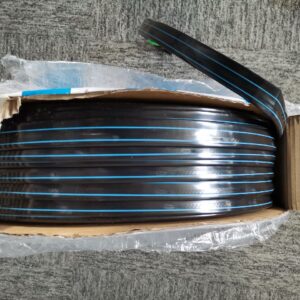How does drip irrigation kit impact the overall health of plants?
Drip irrigation kits can have a significant positive impact on the overall health of plants in several ways:
- Consistent Watering: Drip irrigation kits deliver water directly to the root zone of plants in a slow, steady manner. This consistent and targeted watering ensures that plants receive a uniform and adequate supply of moisture, promoting healthier root development.
- Reduced Stress: Consistent moisture levels provided by drip irrigation kits help reduce water stress on plants. This stability in watering minimizes the fluctuations that can occur with traditional irrigation methods, preventing both overwatering and underwatering that can stress plants.
- Optimized Nutrient Uptake: Proper watering facilitated by drip kits allows plants to better absorb nutrients from the soil. When moisture levels are consistent and controlled, plants can efficiently take up essential nutrients, promoting healthier growth and development.
- Minimized Foliar Diseases: By avoiding overhead watering and keeping the foliage dry, drip irrigation kits reduce the likelihood of foliar diseases caused by excessive moisture on leaves. This can contribute to better overall plant health and reduce the need for fungicides or other treatments.
- Reduced Weed Growth: Drip irrigation kits deliver water directly to the root zone of plants, minimizing water availability for weeds. By keeping the area between plants drier, weed growth can be reduced, leading to healthier plant growth without competition for resources.
- Soil Conservation: The controlled and targeted watering of drip irrigation helps prevent soil erosion and compaction. Conserved soil structure supports healthier root systems and overall plant health.
- Efficient Water Use: Drip irrigation kits are highly efficient in water usage compared to traditional methods like sprinklers. They minimize water waste through evaporation or runoff, maximizing the water available for plant uptake.
- Adaptability: Drip irrigation kits can be tailored to specific plant needs, allowing for customization based on plant type, soil conditions, and climate. China drip irrigation kit manufacturers This adaptability ensures that plants receive the appropriate amount of water, promoting their health and vitality.
- Stress Reduction in Extreme Conditions: During periods of extreme heat or drought, drip irrigation kits provide a lifeline for plants by ensuring they receive essential moisture, helping them withstand stress and maintain their health.
Overall, by providing consistent and efficient watering directly to the roots, drip irrigation kits contribute significantly to the overall health, growth, and resilience of plants, leading to better yields and healthier crops in agricultural settings or thriving gardens for home plant cultivation.
What role does technology play in enhancing drip irrigation kit ?
Technology plays a pivotal role in enhancing drip irrigation kits in several ways, revolutionizing their efficiency, precision, and usability:
- Smart Controllers: Technology has introduced smart controllers that integrate with drip irrigation systems. These controllers use sensors, weather forecasts, and real-time data to adjust watering schedules, optimizing water usage based on specific plant needs and environmental conditions.
- Remote Monitoring and Control: Advanced technologies allow users to remotely monitor and control drip irrigation systems through mobile apps or online platforms. This enables real-time adjustments, even from a distance, ensuring optimal irrigation without physically being present at the site.
- Sensor Integration: Sensors for soil moisture, temperature, humidity, and weather conditions can be integrated into drip irrigation systems. These sensors provide accurate data, allowing for precise and automated adjustments in watering schedules to match the plants’ immediate needs.
- Automation and Precision Equipment: Automated valves, pressure regulators, and advanced emitters or drippers with improved accuracy contribute to precise water delivery. They ensure uniform distribution and efficient use of water throughout the irrigation system.
- Fertigation Systems: Technological advancements enable the integration of fertilization (fertigation) directly into drip irrigation systems. This allows for precise and controlled delivery of nutrients along with water, optimizing plant growth and reducing nutrient wastage.
- Data Analytics and Optimization: Data analytics tools help analyze historical and real-time data collected from drip irrigation systems. This information aids in optimizing irrigation schedules, identifying patterns, and making informed decisions to improve water efficiency and plant health.
- AI and Machine Learning: AI algorithms and machine learning models can analyze complex datasets from various sources, including weather patterns, soil conditions, and plant requirements. They can predict watering needs, optimize schedules, and suggest adjustments for better irrigation practices.
- Energy Efficiency and Sustainability: Technology advancements focus on improving energy efficiency in pumping systems, incorporating renewable energy sources, and reducing the overall environmental footprint of drip irrigation setups.
- Diagnostics and Maintenance: Technology facilitates monitoring the health of the irrigation system, detecting leaks, clogs, or malfunctions promptly. This proactive approach to maintenance ensures the system operates optimally, minimizing downtime and water wastage.
- Adaptability and Scalability: Technological innovations in drip irrigation kits make them more adaptable and scalable, allowing for customization based on specific crop needs, soil types, and varying environmental conditions.
In summary, technology enhances drip irrigation kits by providing smart, data-driven solutions that optimize water usage, improve precision, enable remote control and monitoring, and promote sustainability in agricultural practices. These advancements make drip irrigation more efficient, effective, and adaptable, benefiting both farmers and the environment.

Comments are Disabled